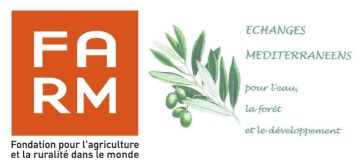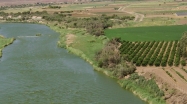Joint Seminar FARM / Echanges Méditerranéens : Water Management around the Mediterranean

A working seminar on water management in drought conditions in Mediterranean zones was held at Paris on the 13th and14th of March, 2007, organised by the not-for-profit association Mediterranean Exchanges for Water, Forest and Development ("Echanges Mediterranean"), with the financial support of FARM. The seminar drew some sixty participants of which 17 came from Morocco, Tunisia, Algeria, Lebanon, Mali and Germany.
In preparation for debate, an analysis of water resources and water needs in Mediterranean countries was presented by Jean Margat, Vice-President of Plan Bleu, and by Jean-François Donzier, head of the International Water Office. Next, technical personnel and officials from Morocco, Tunisia, Algeria and Lebanon detailed the water management situation in their countries.
These factual exposés, presented by Jean-Yves Ollivier of Echanges Mediterranean, underlined the growing scarcity of water resources due to demographic growth on the southern shore of the Mediterranean as well as to climate change which has noticeably reduced annual rainfall (by about 20%) over the last two decades.
Irrigation continues to be the single largest use of water, accounting for about 75% of total consumption, followed by household needs (including tourism), and then industrial uses of water.
Current water shortages have led to taking drawing down reserves in certain aquifers in excess of their natural capacity for renewal. Drought consequences have also included in some years sharp restrictions on irrigation, involving cutting off irrigation of cereal crops, for example.
There is an incontrovertible mandate to respond to demand for drinking water and the improvement of the quality of life. It should be noted that irrigation has allowed Mediterranean countries over the last fifty years to respond to the challenges posed by strong demographic growth and subsequent increase in food needs.
Solutions to water scarcity are costly (large public works projects like desalinisation facilities or water treatment plants) and require changes in human behavior (vigilance against leaks, water-conserving habits), but the general level of awareness has not yet seized the gravity of the increasingly chronic shortages, both now and for the medium to long term. Greater awareness of the situation is essential if significant water savings are to be realized.
The seminar ended with a round table discussion led by Gérard TENDRON, President of the Water bureau of the Executive Council of the French Ministry of Agriculture. Bernard Bachelier, Director of FARM, participated along with representatives from the Mediterranean countries concerned. This debate and other exchanges that took place during the seminar revealed that water shortages affect with comparable degrees of severity the three countries of the Maghreb, while all agreed that raising awareness is an absolute necessity to any hope of improving water conservancy. While solutions for increasing water supply may vary from country to country, for example recourse or not in the near future to desalinisation, all participants insisted on the importance of implementing active water-saving policies, particularly in the agricultural sector as the largest consumer of water, by closely associating farmers with such policies.


















